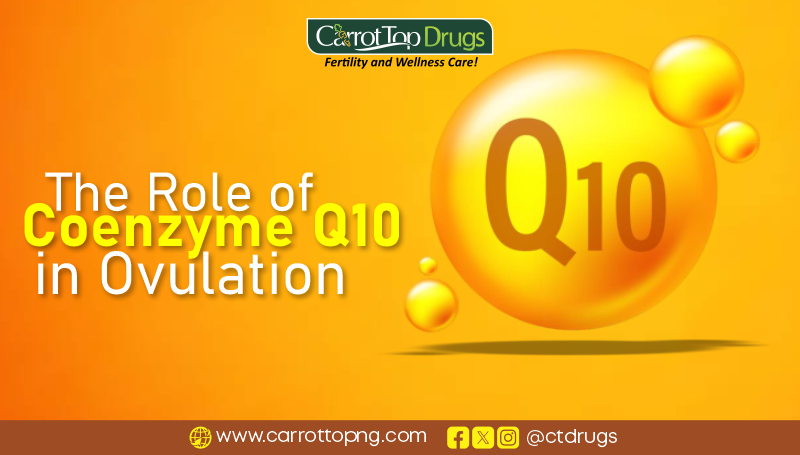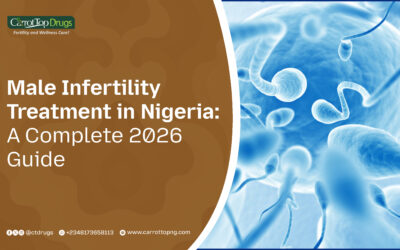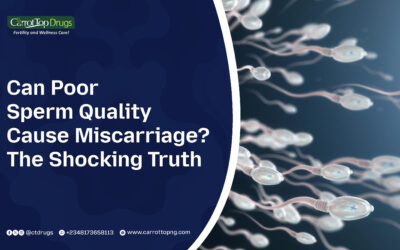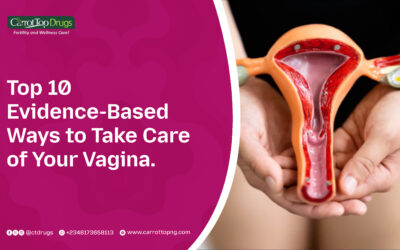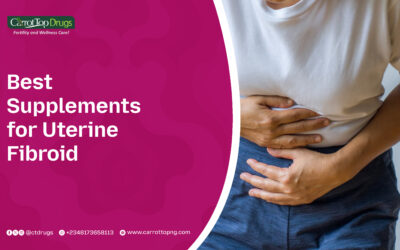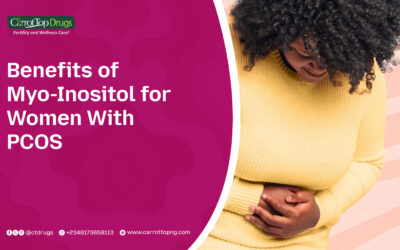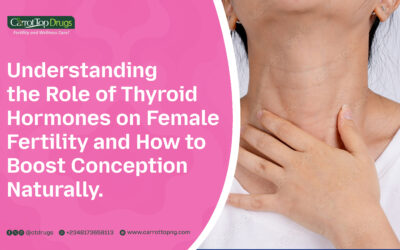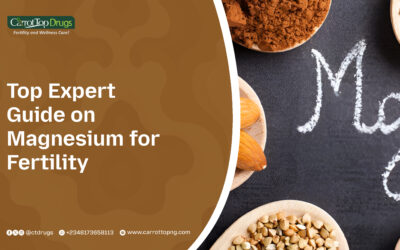Introduction
The role of coenzyme Q10 in ovulation has garnered significant attention in recent years. As women strive for optimal reproductive health, understanding the nutrients and supplements that can enhance fertility is crucial. Coenzyme Q10 (CoQ10) has emerged as a key player in supporting ovulation and overall fertility. This article delves into the role of coenzyme Q10 in ovulation, exploring its benefits, sources, and recommended daily allowances.
What is Coenzyme Q10?
Coenzyme Q10, also known as ubiquinone, is a naturally occurring antioxidant found in every cell of the body. It plays a vital role in energy production within the mitochondria, the powerhouse of the cell. CoQ10 is essential for the production of adenosine triphosphate (ATP), which provides energy for various cellular processes, including those related to ovulation. The role of coenzyme Q10 in ovulation is increasingly being recognized for its potential to enhance female fertility.
Research on the Role of Coenzyme Q10 in Ovulation
Numerous studies have highlighted the role of coenzyme Q10 in ovulation. Research has shown that CoQ10 supplementation can improve ovarian function and increase the chances of successful ovulation. A study by Bentov et al. (2014) demonstrated that CoQ10 supplementation improved ovarian response in older women undergoing fertility treatments. Another study by Xu et al. (2018) found that CoQ10 improved the quality of oocytes (egg cells) and increased the likelihood of successful ovulation. These findings underscore the significant role of coenzyme Q10 in ovulation and fertility.
How Coenzyme Q10 Impacts Ovulation
- Enhancing Mitochondrial Function
The role of coenzyme Q10 in ovulation is closely linked to its ability to enhance mitochondrial function. Mitochondria are responsible for producing the energy required for various cellular activities, including those critical for ovulation. By improving mitochondrial efficiency, CoQ10 supports the energy-intensive process of follicular development and egg maturation, essential steps in ovulation.
- Hormonal Regulation
The role of coenzyme Q10 in ovulation also extends to hormonal regulation. CoQ10 supports the production and balance of hormones necessary for ovulation. It helps maintain healthy levels of estrogen and progesterone, hormones that regulate the menstrual cycle and prepare the body for ovulation. By ensuring hormonal balance, CoQ10 promotes regular ovulatory cycles and improves fertility outcomes (Grindler et al., 2016).
- Reducing Inflammation
Inflammation can negatively impact ovulation and overall reproductive health. The role of coenzyme Q10 in ovulation includes its anti-inflammatory effects, which help create a conducive environment for ovulation. By reducing inflammation, CoQ10 supports healthy ovarian function and enhances the likelihood of successful ovulation (Nakamura et al., 2012).
- Improving Egg Quality
Another important aspect of the role of coenzyme Q10 in ovulation is its impact on egg quality. High-quality oocytes are crucial for successful fertilization and embryo development. CoQ10’s antioxidant properties protect eggs from oxidative stress, which can damage cells and reduce fertility. Studies by Xu et al have shown that CoQ10 supplementation leads to better egg quality, thereby enhancing the chances of ovulation and successful conception.
Mechanism of Action of Coenzyme Q10 in Improving Egg Quality
The role of coenzyme Q10 in ovulation is deeply intertwined with its ability to enhance egg quality through various biochemical mechanisms. Here’s a detailed look at how CoQ10 accomplishes this:
1. Antioxidant Properties:
Coenzyme Q10 is a potent antioxidant that neutralizes free radicals and reduces oxidative stress within the cells. Oxidative stress can lead to cellular damage, impacting the integrity and quality of oocytes. By scavenging free radicals, CoQ10 protects the oocytes from oxidative damage, maintaining their structural and functional integrity.
2. Mitochondrial Function:
The mitochondria, known as the powerhouse of the cell, play a crucial role in energy production. The energy-intensive process of oocyte maturation relies heavily on efficient mitochondrial function. CoQ10 is essential for the electron transport chain in mitochondria, facilitating ATP production. Increased ATP levels provide the necessary energy for oocyte growth, maturation, and subsequent fertilization, thereby improving overall egg quality.
3. DNA Repair and Synthesis:
DNA integrity is vital for the proper development and function of oocytes. Coenzyme Q10 supports DNA repair mechanisms, ensuring that any damage to the oocyte’s genetic material is promptly and effectively repaired. This helps in maintaining genetic stability, which is crucial for the viability of the oocyte and the success of fertilization and embryo development.
4. Reduction of Apoptosis:
Apoptosis, or programmed cell death, can negatively impact oocyte quality and quantity. CoQ10 has been shown to reduce apoptosis in oocytes by stabilizing mitochondrial membranes and preventing the release of pro-apoptotic factors. This protective effect ensures a higher survival rate of oocytes, contributing to better quality and improved fertility outcomes
5. Hormonal Regulation:
CoQ10 also influences the hormonal environment surrounding the oocytes. It supports the balance of reproductive hormones such as estrogen and progesterone, which are crucial for follicular development and oocyte maturation. Proper hormonal regulation ensures that the oocytes develop in an optimal environment, enhancing their quality and readiness for fertilization.
6. Improvement of Cellular Bioenergetics:
Enhanced cellular bioenergetics due to CoQ10 supplementation means that oocytes have more available energy to sustain their functions. This includes the energy required for meiotic spindle formation, chromosome alignment, and other critical processes during oocyte maturation. Efficient energy utilization leads to the development of high-quality oocytes that are more likely to result in successful ovulation and conception.
Recommended Daily Allowance (RDA) of Coenzyme Q10
While there is no established RDA for CoQ10, studies suggest that a daily dose of 100-600 mg is effective for improving fertility and supporting ovulation. It is important to consult with a healthcare provider before starting any supplementation, especially for individuals with specific health conditions or those undergoing fertility treatments. Supplements like Evergreen Eggboost contain CoQ10 and can help meet this requirement.
Natural Sources of Coenzyme Q10
CoQ10 can be obtained from various dietary sources. Foods rich in coenzyme Q10 include:
– Organ Meats: Heart, liver, and kidney
– Fatty Fish: Sardines, mackerel, and trout
– Vegetables: Spinach, broccoli, and cauliflower
– Legumes: Peanuts and soybeans
– Nuts and Seeds: Sesame seeds and pistachios
Incorporating these foods into your diet can help boost your CoQ10 levels and support the role of coenzyme Q10 in ovulation.
Coenzyme Q10 Supplements
For those who may not get enough CoQ10 from their diet, supplements are available. CoQ10 supplements come in two forms: ubiquinone and ubiquinol. Ubiquinol is the active, more readily absorbed form of CoQ10. Supplements like our Evergreen Eggboost can provide a convenient way to ensure adequate intake of CoQ10, particularly for women looking to enhance their fertility and support ovulation.
Conclusion
The role of coenzyme Q10 in ovulation is multifaceted, encompassing mitochondrial function, egg quality, hormonal balance, and inflammation reduction. Adequate CoQ10 levels are essential for supporting ovulation and improving fertility outcomes. Whether through diet or supplementation, ensuring sufficient CoQ10 intake can play a significant role in enhancing reproductive health.
FAQs
1. What is the role of coenzyme Q10 in ovulation?
The role of coenzyme Q10 in ovulation includes enhancing mitochondrial function, improving egg quality, regulating hormones, and reducing inflammation.
2. How does coenzyme Q10 improve egg quality?
Coenzyme Q10 improves egg quality by protecting eggs from oxidative stress and enhancing mitochondrial efficiency.
3. Can coenzyme Q10 supplements help with ovulation?
Yes, CoQ10 supplements like Evergreen Eggboost can support ovulation by boosting mitochondrial function, improving egg quality, and balancing hormones.
4. What are the natural sources of coenzyme Q10?
Natural sources of CoQ10 include organ meats, fatty fish, vegetables, legumes, and nuts and seeds.
5. What is the recommended daily allowance of coenzyme Q10 for fertility?
While there is no established RDA, a daily dose of 100-200 mg is commonly recommended for improving fertility and supporting ovulation.
6. Are there any side effects of coenzyme Q10 supplements?
CoQ10 supplements are generally safe, but some people may experience mild side effects such as gastrointestinal upset. It’s best to consult a healthcare provider before starting supplementation.
7. Can coenzyme Q10 help with other aspects of reproductive health?
Yes, CoQ10 can support overall reproductive health by improving mitochondrial function, reducing oxidative stress, and balancing hormones.

